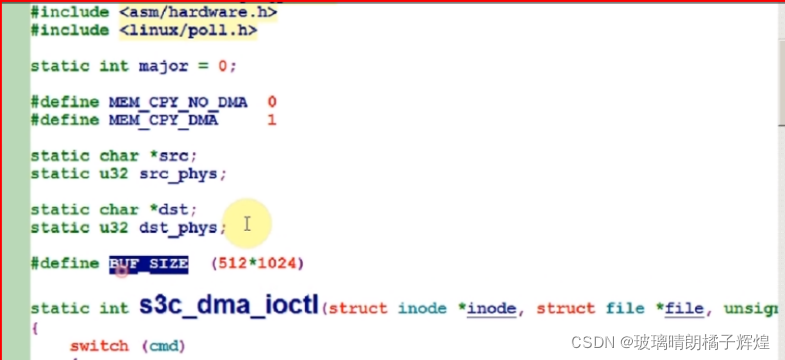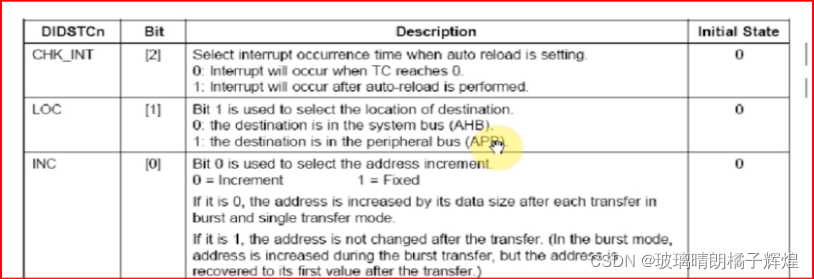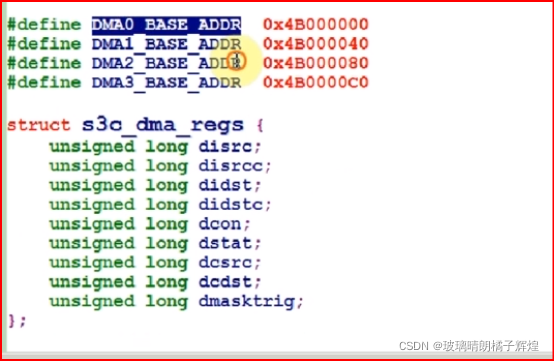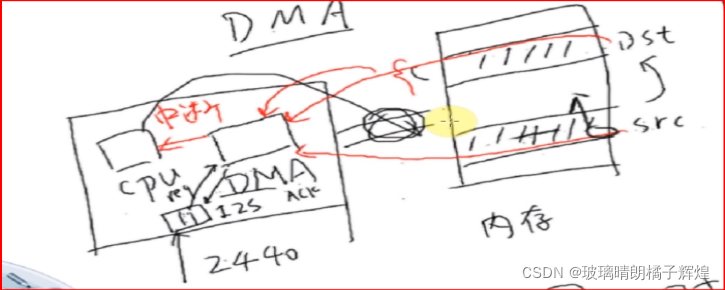1.kmalloc 分配的虚拟地址连续,物理地址一定连续
2.想用DMA必须分配连续的内存
3. kmalloc特殊之处在于它分配的内存是物理上连续的,这对于要进行DMA的设备十分重要. 而用vmalloc分配的内存只是线性地址连续,物理地址不一定连续,不能直接用于DMA。
定义源src 目的dst 源物理地址src_phys 目的物理地址dst_phys 大小定义宏

4.在驱动的入口函数分配缓冲区(注意不能用vmalloc分配出来物理地址不一定连续
)


第一个源表示在系统总线上还是外设总线上
第二个源地址是递增的还是固定的

目的地在内存上还是外设上
6.操作寄存器

创建结构体封装寄存器unsigned long型
DMA0和DMA1,DMA2寄存器地址然后定义变量static volatile struct s3c_dma_regs *dma_regs;
然后再去映射物理地址ioremap。

2.具体步骤
把源,目的,长度告诉DMA
源地址操作寄存器(注意是物理地址)

第一位控制源地址在内存还是在外设,如下图。

目的地址的物理地址

目的寄存器操作


DMA控制寄存器
(1)DMA模式
(2)同步 外设发给单片机请求DMA,答应给我一个DMArequst给我一个回应信号ACK
(3)中断
(4)使能中断知道他已经传输完成。


第二个模式会一直站住总线知道DMA传输完

23位设为0用软件触发的

数据传输大小一个字节,

还有TSZ和DSZ
DSZ:读写数据的大小 传输一次一字节还是4字节
TSZ:单次传输R/W一次 burst传输R/W四次
TC: 传输多少次
总长度=TCTSZDSZ。
dma_regs->dcon = (1<<30)|(1<<29)|(0<<28)|(1<<27)|(0<<23)|(0<<20)|(BUF_SIZE<<0);
/* 使能中断,单个传输,软件触发, */
启动DMA
如何意识到已经传输完成?
(1)完成会产生中断,所以我们先requst_irq
if (request_irq(IRQ_DMA3, s3c_dma_irq, 0, "s3c_dma", 1))
{
printk("can't request_irq for DMA\n");
return -EBUSY;
}
tatic irqreturn_t s3c_dma_irq(int irq, void *devid)
{
/* 唤醒 */
ev_dma = 1; /* 中断事件标志复位 */
wake_up_interruptible(&dma_waitq); /* 唤醒休眠的进程 */
return IRQ_HANDLED;
}
在启动DMA后休眠在中断后唤醒
static DECLARE_WAIT_QUEUE_HEAD(dma_waitq); /* 定义队列 */
wait_event_interruptible(dma_waitq, ev_dma); /* 需要定义中断事件标志来判断条件是否满足 */
static volatile int ev_dma = 0;
/* 启动DMA */
dma_regs->dmasktrig = (1<<1) | (1<<0);
/* 如何知道DMA什么时候完成? /
/ 休眠 */
wait_event_interruptible(dma_waitq, ev_dma);
if (memcmp(src, dst, BUF_SIZE) == 0)
{
printk("MEM_CPY_DMA OK\n");
}else
{
printk("MEM_CPY_DMA ERROR\n");
}
break;
驱动代码整合
#include <linux/module.h>
#include <linux/kernel.h>
#include <linux/fs.h>
#include <linux/init.h>
#include <linux/delay.h>
#include <linux/irq.h>
#include <asm/uaccess.h>
#include <asm/irq.h>
#include <asm/io.h>
#include <asm/arch/regs-gpio.h>
#include <asm/hardware.h>
#include <linux/poll.h>
#include <linux/dma-mapping.h>
#define MEM_CPY_NO_DMA 0
#define MEM_CPY_DMA 1
#define BUF_SIZE (512*1024)
#define DMA0_BASE_ADDR 0x4B000000
#define DMA1_BASE_ADDR 0x4B000040
#define DMA2_BASE_ADDR 0x4B000080
#define DMA3_BASE_ADDR 0x4B0000C0
struct s3c_dma_regs {
unsigned long disrc;
unsigned long disrcc;
unsigned long didst;
unsigned long didstc;
unsigned long dcon;
unsigned long dstat;
unsigned long dcsrc;
unsigned long dcdst;
unsigned long dmasktrig;
};
static int major = 0;
static char *src;
static u32 src_phys;
static char *dst;
static u32 dst_phys;
static struct class *cls;
static volatile struct s3c_dma_regs *dma_regs;
static DECLARE_WAIT_QUEUE_HEAD(dma_waitq);
/* 中断事件标志, 中断服务程序将它置1,ioctl将它清0 */
static volatile int ev_dma = 0;
static int s3c_dma_ioctl(struct inode *inode, struct file *file, unsigned int cmd, unsigned long arg)
{
int i;
memset(src, 0xAA, BUF_SIZE);
memset(dst, 0x55, BUF_SIZE);
switch (cmd)
{
case MEM_CPY_NO_DMA :
{
for (i = 0; i < BUF_SIZE; i++)
dst[i] = src[i];
if (memcmp(src, dst, BUF_SIZE) == 0)
{
printk("MEM_CPY_NO_DMA OK\n");
}
else
{
printk("MEM_CPY_DMA ERROR\n");
}
break;
}
case MEM_CPY_DMA :
{
ev_dma = 0;
/* 把源,目的,长度告诉DMA */
dma_regs->disrc = src_phys; /* 源的物理地址 */
dma_regs->disrcc = (0<<1) | (0<<0); /* 源位于AHB总线, 源地址递增 */
dma_regs->didst = dst_phys; /* 目的的物理地址 */
dma_regs->didstc = (0<<2) | (0<<1) | (0<<0); /* 目的位于AHB总线, 目的地址递增 */
dma_regs->dcon = (1<<30)|(1<<29)|(0<<28)|(1<<27)|(0<<23)|(0<<20)|(BUF_SIZE<<0); /* 使能中断,单个传输,软件触发, */
/* 启动DMA */
dma_regs->dmasktrig = (1<<1) | (1<<0);
/* 如何知道DMA什么时候完成? */
/* 休眠 */
wait_event_interruptible(dma_waitq, ev_dma);
if (memcmp(src, dst, BUF_SIZE) == 0)
{
printk("MEM_CPY_DMA OK\n");
}
else
{
printk("MEM_CPY_DMA ERROR\n");
}
break;
}
}
return 0;
}
static struct file_operations dma_fops = {
.owner = THIS_MODULE,
.ioctl = s3c_dma_ioctl,
};
static irqreturn_t s3c_dma_irq(int irq, void *devid)
{
/* 唤醒 */
ev_dma = 1;
wake_up_interruptible(&dma_waitq); /* 唤醒休眠的进程 */
return IRQ_HANDLED;
}
static int s3c_dma_init(void)
{
if (request_irq(IRQ_DMA3, s3c_dma_irq, 0, "s3c_dma", 1))
{
printk("can't request_irq for DMA\n");
return -EBUSY;
}
/* 分配SRC, DST对应的缓冲区 */
src = dma_alloc_writecombine(NULL, BUF_SIZE, &src_phys, GFP_KERNEL);
if (NULL == src)
{
printk("can't alloc buffer for src\n");
free_irq(IRQ_DMA3, 1);
return -ENOMEM;
}
dst = dma_alloc_writecombine(NULL, BUF_SIZE, &dst_phys, GFP_KERNEL);
if (NULL == dst)
{
free_irq(IRQ_DMA3, 1);
dma_free_writecombine(NULL, BUF_SIZE, src, src_phys);
printk("can't alloc buffer for dst\n");
return -ENOMEM;
}
major = register_chrdev(0, "s3c_dma", &dma_fops);
/* 为了自动创建设备节点 */
cls = class_create(THIS_MODULE, "s3c_dma");
class_device_create(cls, NULL, MKDEV(major, 0), NULL, "dma"); /* /dev/dma */
dma_regs = ioremap(DMA3_BASE_ADDR, sizeof(struct s3c_dma_regs));
return 0;
}
static void s3c_dma_exit(void)
{
iounmap(dma_regs);
class_device_destroy(cls, MKDEV(major, 0));
class_destroy(cls);
unregister_chrdev(major, "s3c_dma");
dma_free_writecombine(NULL, BUF_SIZE, src, src_phys);
dma_free_writecombine(NULL, BUF_SIZE, dst, dst_phys);
free_irq(IRQ_DMA3, 1);
}
module_init(s3c_dma_init);
module_exit(s3c_dma_exit);
MODULE_LICENSE("GPL");